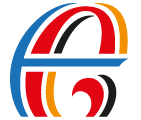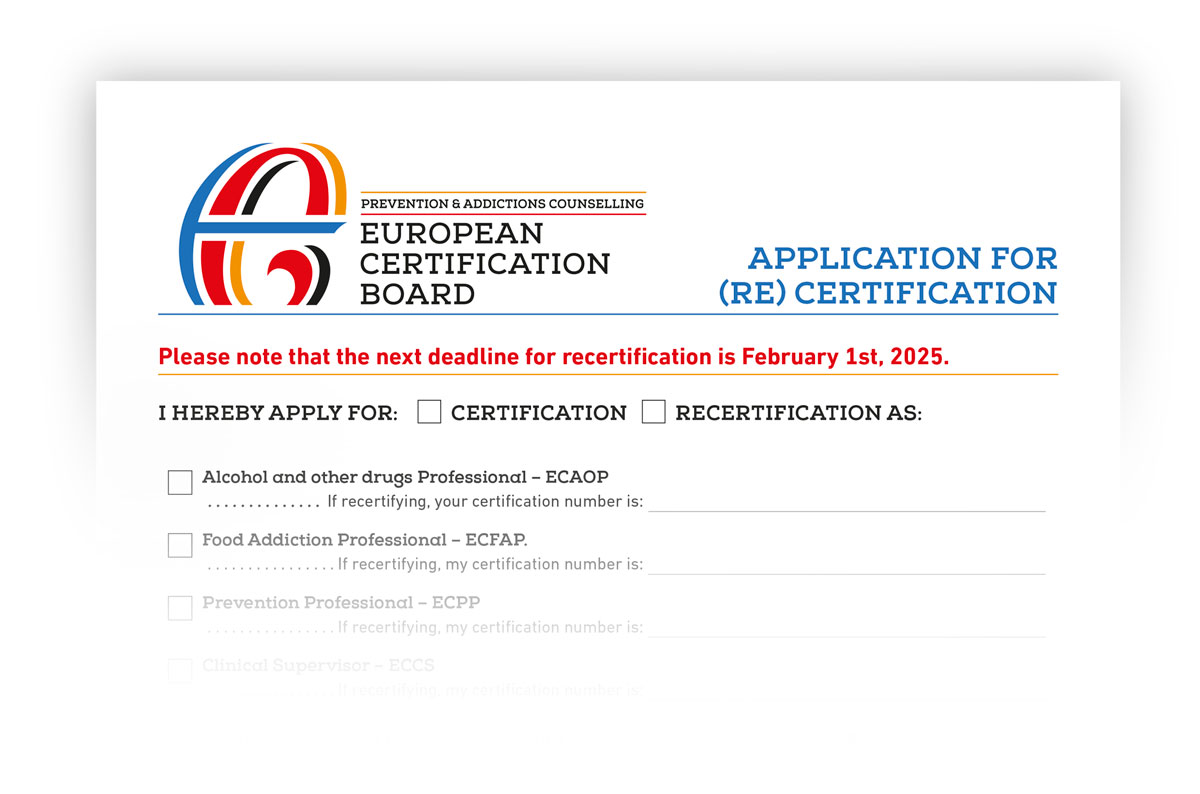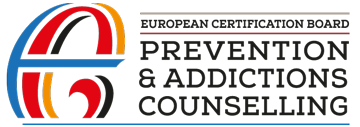Certification
ECB certifies addictions counselors, prevention specialists, and clinical supervisors. Applicants for certification must meet defined criteria regarding knowledge and work experience as well as approving the Ethical Standards of ECB.
Requirements for certification by the European Certification Board:
Requirements for certification of ECAP (Addictions Professional):
- Work experience: 6.000 hours of supervised work experience specific to alcoholic and other drug treatment. University degrees in behavioral science substitute hours: Bachelor 2.000 hours, Masters 4.000 hours.
- Education: 270 hours, (150 from schools approved by ECB), at least 6 of those for counselor ethics.
- Supervision: 300 hours specific to 12 core domains, 10 minimum for each domainExamination: Pass the relevant tests, approved by ECB.
- Code of ethics: Sign an ethics statement.
- Recertification: 40 hours of continuing education every two years.
Requirements for certification of ECFAP (Food Addiction Professional):
- Work experience: 6.000 hours of supervised work experience specific to food addiction treatment. University degrees in behavioral science substitute hours: Bachelor 2.000 hours, Masters 4.000 hours.
- Education: 270 hours, (150 from schools approved by ECB), at least 6 of those for counselor ethics.
- Supervision: 300 hours specific to 12 core domains, 10 minimum for each domain.
- Examination: Pass the relevant tests, approved by ECB.
- Code of ethics: Sign an ethics statement.
- Recertification: 40 hours of continuing education every two years.
Requirements for certification of ECPP (Prevention Professional):
- Work experience: 2.000 hours of prevention work experience.
- Education: 100 hours of prevention specific education, of those, minimum 6 in ethics.
- Supervision: 120 hours specfic to the 12 core domains, 10 min for each.
- Examination: Pass the relevant test.
- Code of ethics: Sign an ethics statement.
- Recertification: 40 hours of continuing education every two years.
Requirements for certification of ECCS (Clinical Supervisor):
- Prerequisite: Certification of ECAP, ECFAP or ECPP
- Work experience: 10.000 hours of relevant work experience, plus 4000 hours of supervising experience, which may be included in the 10.000 hrs.
- University degrees substitute: Bachelor 2.000 hours, Masters 4.000 hours.
- Education: 30 hours specific to the first five domains 4 minimum for each.
- Examination: Pass the relevant test, approved by ECB.
- Code of ethics: Sign an ethics statement.
- Recertification: 6 hours of continuing education every two years. May be part of recertification for other certifications.
Ethical Standards for Alcoholism and Drug Abuse Counselors FOOD ADDICTION COUNSELORS and prevention specialists
Those certified by the European Certification Board are professional alcoholism and drug abuse counselors, food addiction counselors, and prevention specialists who, as responsible health-care professionals, believe in the dignity and worth of human beings. In the practice of their profession they assert that the ethical principles of autonomy, beneficence and justice must guide their professional and societal expectations, obligations and conduct. As professionals dedicated to the treatment of chemically dependent and food addicted clients and their families, they believe that they can effectively treat its individual and familial manifestations. Alcoholism and drug abuse counselors, prevention specialists, and food addiction counselors dedicate themselves to the promotion of the best interests of their society, their clients, their profession and their colleagues.
SPECIFIC PRINCIPLES
Principle 1: Nondiscrimination. The alcoholism and drug abuse counselor, the prevention specialist, and the food addiction counselor must not discriminate against clients or professionals based on race, religion, age, sex, handicaps, national origin, sexual orientation or economic condition.
Principle 2: Responsibility. The alcoholism and drug abuse counselor, the prevention specialist and the food addiction counselor must espouse objectivity and integrity, and maintain the highest standards in the services the counselor offers.
- The alcoholism and drug abuse counselor, the prevention specialist, and the food addiction counselor, as teacher, must recognize the counselor’s primary obligation to help others acquire knowledge and skill in dealing with the disease of chemical dependency.
- The alcoholism and drug abuse counselor and the food addiction counselor, as practitioner, must accept the professional challenge and responsibility deriving from the counselor’s work.
Principle 3: Competence. The alcoholism and drug abuse counselor, the prevention specialist, and the food addiction counselor must recognize that the profession is founded on national standards of competency which promote the best interests of society, the client, the counselor and the profession as a whole. The counselor must recognize the need for ongoing education as a component of professional competency.
- The alcoholism and drug abuse counselor, the prevention specialist, and the food addiction counselor must prevent the practice of alcoholism and drug abuse counseling and food addiction counseling by unqualified and/or unauthorized persons.
- The alcoholism and drug abuse counselor, the prevention specialist, and the food addiction counselor who is aware of unethical conduct or unprofessional modes of practice must report such violations to the appropriate certifying authority.
- The alcoholism and drug abuse counselor, the prevention specialist, and the food addiction counselor must recognize boundaries and limitations of a counselor’s competencies and not offer services or use techniques outside of these professional competencies.
- The alcoholism and drug abuse counselor, the prevention specialist, and the food addiction counselor must recognize the effect of impairment on professional techniques and must be willing to seek appropriate treatment for oneself or for a colleague. The counselor or the specialist must support peer assistance programs in this respect.
Principle 4: Legal Standards and Moral Standards. The alcoholism and drug abuse counselor, the prevention specialist, and the food addiction counselor must uphold the legal and accepted moral codes which pertain to professional conduct, legal and accepted moral codes of our society.
- The alcoholism and drug abuse counselor, the prevention specialist, and the food addiction counselor must not claim either directly or by implication, professional qualifications/affiliations that the counselor does not possess.
- The alcoholism and drug abuse counselor, the prevention specialist, and the food addiction counselor must not use the affiliation with the Nordic/Baltic Association of Addiction Professionals for purposes that are not consistent with the stated purposes of the association.
- The alcoholism and drug abuse counselor, the prevention specialist, and the food addiction counselor must not associate with or permit the counselor’s name to be used in connection with any services or products in a way that is incorrect or misleading.
- The alcoholism and drug abuse counselor, the prevention specialist, and the food addiction counselor associated with the development or promotion of books or other products offered for commercial sale must be responsible for ensuring that such books or products are presented in a professional and factual way.
- The alcoholism and drug abuse counselor, the prevention specialist, and the food addiction counselor must obey civil and criminal laws, and commit no act involving moral turpitude of which would bring discredit to the profession.
Principle 5: Public Statements. The alcoholism and drug abuse counselor, the prevention specialist, and the food addiction counselor must respect the limits of present knowledge in public statements concerning alcoholism and other forms of drug addiction and food addiction.
- The alcoholism and drug abuse counselor, the prevention specialist, and the food addiction counselor who represents the field of alcoholism and drug abuse counseling to clients, other professionals, or to the general public must report fairly and accurately the appropriate information.
- The alcoholism and drug abuse counselor, the prevention specialist, and the food addiction counselor must acknowledge and document materials and techniques used.
- The alcoholism and drug abuse counselor, the prevention specialist, and the food addiction counselor who conducts training in alcoholism and drug abuse counseling skills or techniques must indicate to the audience the requisite training/qualification to properly perform those skills and techniques.
Principle 6: Publication Credit. The alcoholism and drug abuse counselor, the prevention specialist, and the food addiction counselor must assign credit to all who have contributed to the published material and for the work upon which the publication is based.
- The alcoholism and drug abuse counselor, the prevention specialist, and the food addiction counselor must recognize joint authorship, major contributions of professional character made by several persons to a common project. The author who has made the principal contribution to a publication must be identified as a first listed.
- The alcoholism and drug abuse counselor, the prevention specialist, and the food addiction counselor must acknowledge in footnotes or an introductory statement minor contributions of a professional character, extensive clerical or similar assistance and other minor contributions.
- The alcoholism and drug abuse counselor, the prevention specialist, and the food addiction counselor must acknowledge, through specific citations, unpublished, as well as published, materials that have direct influences the research or writing.
- The alcoholism and drug abuse counselor, the prevention specialist, and the food addiction counselor who compiles and edits for publication the contributions of others must list oneself as editor, along with the names of those others who have contributed.
Principle 7: Client Welfare. The alcoholism and drug abuse counselor, the prevention specialist, and the food addiction counselor must respect the integrity and protect the welfare of the person or group with whom the counselor is working.
- The alcoholism and drug abuse counselor, the prevention specialist, and the food addiction counselor must define for self and others the nature and direction of loyalties and responsibilities and keep all parties concerned informed of these commitments.
- The alcoholism and drug abuse counselor, the prevention specialist, and the food addiction counselor, in the presence of professional conflict, must be concerned primarily with the welfare of the client.
- The alcoholism and drug abuse counselor, the prevention specialist, and the food addiction counselor must terminate a counseling or consulting relationship when it is reasonably clear to the counselor that the client is not benefiting from it.
- The alcoholism and drug abuse counselor, the prevention specialist, and the food addiction counselor, in referral cases, must assume the responsibility for the client’s welfare either by mutual agreement and/or by the client becoming engaged with another professional. In situations when a client refuses treatment, referral or recommendations, the alcoholism and drug abuse counselor, the prevention specialist, and the food addiction counselor must carefully consider the welfare of the client by weighing the benefits of continued treatment or termination and must act in the best interest of the client.
- The alcoholism and drug abuse counselor, the prevention specialist, and the food addiction counselor who asks a client to reveal personal information from other professionals or allows information to be divulged must inform the client of the nature of such transaction. The information released or obtained with informed consent must be used for expressed purposes only.
- The alcoholism and drug abuse counselor, the prevention specialist, and the food addiction counselor must not use a client in a demonstration role in a workshop setting where such participation would potentially harm the client.
- The alcoholism and drug abuse counselor, the prevention specialist, and the food addiction counselor must ensure the presence of an appropriate setting for clinical work to protect the client from harm, and the counselor and the profession from
- The alcoholism and drug abuse counselor, the prevention specialist, and the food addiction counselor must collaborate with other health-care professionals in providing a supportive environment for the client who is receiving prescribed medications.
Principle 8: Confidentiality. The alcoholism and drug abuse counselo, the prevention specialist, and the food addiction counselor must embrace, as a primary obligation, the duty of protecting the privacy of clients and must not disclose confidential information acquired in teaching, practice or investigation.
- The alcoholism and drug abuse counselor, the prevention specialist, and the food addiction counselor must inform the client and obtain agreement in areas likely to affect the client’s participation including the recording of an interview, the use of interview material for training purposes and the observation of an interview by another person.
- The alcoholism and drug abuse counselor, the prevention specialist, and the food addiction counselor must make provisions for the maintenance of confidentiality and the ultimate disposition of confidential records.
- The alcoholism and drug abuse counselor, the prevention specialist, and the food addiction counselor must reveal information received in confidence only when there is a clear and present danger to the client or to other persons, and then only to appropriate professional workers or public authorities.
- The alcoholism and drug abuse counselor, the prevention specialist, and the food addiction counselor must discuss the information obtained in clinical or consulting relationships only in appropriate settings, and only for professional purposes clearly concerned with the case. Written and oral reports must present only data germane to the purpose of the evaluation and every effort must be made to avoid undue invasion of privacy.
The alcoholism and drug abuse counselor, the prevention specialist, and the food addiction counselor must use clinical and other material in classroom teaching and writing only when the identity of the persons involved is adequately disguised.
Principle 9: Client Relationships. The alcoholism and drug abuse counselor, the prevention specialist, and the food addiction counselor must inform the prospective client of the important aspects of the potential relationship.
- The alcoholism and drug abuse counselor, the prevention specialist, and the food addiction counselor must inform the client and obtain the client’s agreement in areas likely to affect the client’s participation including the recording of an interview, the use of interview material for training purposes and /or observation of an interview by another person.
- The alcoholism and drug abuse counselor, the prevention specialist, and the food addiction counselor must inform the designate guardian or responsible person of circumstances which may influence the relationship, when the client is a minor or incompetent.
- The alcoholism and drug abuse counselor, the prevention specialist, and the food addiction counselor must not enter into a professional relationship with members of one’s own family, intimate friends or close associates, or others whose welfare might be jeopardized by such a dual relationship.
- The alcoholism and drug abuse counselor, the prevention specialist, and the food addiction counselor must not engage in any type of sexual activity with a client.
Principle 10: Interprofessional Relationships. The alcoholism and drug abuse counselor, the prevention specialist, and the food addiction counselor must treat colleagues with respect, courtesy and fairness, and must afford the same professional courtesy to other professionals.
- The alcoholism and drug abuse counselor, the prevention specialist, and the food addiction counselor must not offer professional services to a client in counseling with another professional except with the knowledge of the other professional or after the termination of the client’s relationship with the other professional.
- The alcoholism and drug abuse counselor, the prevention specialist, and the food addiction counselor must cooperate with duly constituted professional ethics committees and promptly supply necessary information unless constrained by the demands of confidentiality.
Principle 11: Remuneration. The alcoholism and drug abuse counselor, the prevention specialist, and the food addiction counselor must establish financial arrangements in professional practice and in accord with the professional standards that safeguard the best interests of the client, of the counselor and of the profession.
- The alcoholism and drug abuse counselor, the prevention specialist, and the food addiction counselor must consider carefully the ability of the client to meet the financial cost in establishing rates for professional services.
- The alcoholism and drug abuse counselor, the prevention specialist, and the food addiction counselor must not send or receive any commission or rebate or any other form of remuneration for referral of clients for professional services. The counselor must not engage in fee splitting.
- The alcoholism and drug abuse counselor, the prevention specialist, and the food addiction counselor in clinical or counseling practice must not use one’s relationship with clients to promote personal gains or the profit of an agency or commercial enterprise of any kind.
- The alcoholism and drug abuse counselor, the prevention specialist, and the food addiction counselor must not accept a private fee or any gift or gratuity for professional work with a person who is entitled to such services through an institution or agency. The policy of a particular agency may make explicit provisions for private work with its clients by members of its staff, and in such instances the client must be fully apprised of all policies affecting the client.
Principle 12: Societal Obligations. The alcoholism and drug abuse counselor, the prevention specialist, and the food addiction counselor must advocate changes in public policy and legislation to afford opportunity and choice for all persons whose lives are impaired by the disease of alcoholism and other forms of drug addiction and food addiction. The counselors must inform the public through active civic and professional participation in community affairs of the effects of alcoholism and drug abuse addiction and food addiction and must act to guarantee that all persons, especially the needy and disadvantaged, have access to the necessary resources and services. The alcoholism and drug abuse counselor and the food addiction counselor must adopt a personal and professional stance which promotes the well-being of all human beings.
Below is a button to a PDF application form for certification or recertification by ECB. Please fill in the appropriate information, save it to your computer and sign it digital or by printing and sign it, send it to ECB, as a signed pdf file or scanned file by email to eurocert@xnet.is.
Ethical Standards for ECB counselors and prevention specialists are listed on this site. Please read and indicate on the application whether you can confirm that you agree with those standards and are willing to commit to them. Your indication of this on the form equals a binding agreement with those standards.





Social Contact